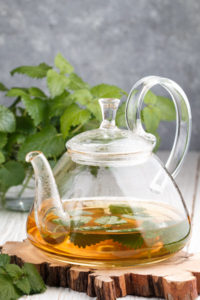Table of Contents
When something happens during your day, regardless of what that stressor is, your body responds the same way every time. Your HPA axis kicks in and sends a cascade of hormones into your system. Dominated by a flood of cortisol from your adrenals. To fight the effects of stress in your body.
This stress response can be caused by fear or anxiety set off by a remark from your spouse, someone cutting you off in traffic, not enough sleep, excess exercise, illness, or the ongoing threat of contracting COVID-19.
When the stress ends, your body is designed to return to normal. But the thing is, in our modern world, and for most of us, the stress often continues. The symptoms stay under the radar and we’re not aware of it.
The symptoms of chronic stress show up as brain fog, anxiety and depression, weight gain around your waist, not feeling rested after a night’s sleep, and catching every cold or flu bug that’s going around.
As a neurohacker working on optimizing cognitive performance, it’s important to realize that chronic stress and cortisol will damage your brain. And work against everything you’re trying to do with nootropics.
Fortunately, you have easy access to an elite-class of nootropics that help your body cope with stress. And avoid the damage it can cause. Bringing your body back into a balanced, healthy, optimized state. They are called “adaptogens”.
Stress causes brain damage
Neuroscientists at the University of California, Berkeley found that chronic stress triggers long-term changes in brain structure and function.[i] Chronic stress changes neural networks.
Cortisol creates a domino effect that hard-wires pathways between the hippocampus and amygdala. (The amygdala (lizard brain) is the area responsible for your fight-or-flight response).
This hard-wiring caused by stress is not the way your brain was designed. But chronic, ongoing stress tricks the brain into rebuilding circuits and hunkering down for the long haul.
This re-wiring appears to be permanent. Unless you intervene with something like an adaptogen.
Chronic stress seems to ‘flip a switch’ in stem cells in the brain. And turns them into a type of cell that prevents connections to the prefrontal cortex. Preventing learning and memory.
And laying down the scaffolding linked to anxiety, depression and PTSD (Post Traumatic Stress Disorder).
What is an adaptogen?
Humans have been using plants for food and medicine for thousands of years. Emperor Shen-Nung, the 2nd of China’s emperors (3500-2600 BC) catalogued over 365 species of medicinal plants. Many of which are still used in traditional Chinese medicine today.[ii]
Of those medicinal plants, a couple stand out as unique in their ability to help humans cope with physical and mental stress. Other cultures and ancient healing systems have since added to this short list. We now call these herbal remedies “adaptogens”.
The word adaptogen is derived from the Latin adaptare (to adjust or adapt). It was first used by Soviet physician and scientist Nikolai Lazarev in 1947. Lazarev was joined by Dr. Israel Brekham, and as a team began the search for botanicals with adaptogenic qualities.
The first plant the team studied was Panax Ginseng which has been in use for millennia. And was written about by Shen-Nung as a remedy over 5000 years ago.[iii]
The definition of “adaptogen” includes “metabolic regulators (of a natural origin) which increase the ability of an organism to adapt to environmental factors and to avoid damage from such factors.”
It turns out that many of these “metabolic regulators” are compounds found in certain plants that help them cope with growing in a stressful environment.
These compounds help plants adapt to extreme temperatures, resist insects that would otherwise do them harm, or cope with toxins drawn into the plant from the soil it’s growing in.
Ancient medical practitioners discovered that a few of these plants, or compounds derived by extraction, transferred their benefits to humans. And help us cope with various kinds of stress too.
How Adaptogens Work
Adding adaptogens to your stack can improve alertness, concentration, focus, learning, memory, mood and reduce brain fog. But the primary purpose of adding an adaptogen to your nootropic stack is to reduce physical and mental stress. And bring balance back to your life.
Each herbal supplement classified as an adaptogen has a different mechanism of action in your brain and body. But overall, adaptogens work by:
- Balancing the production of neurotransmitters
- Boosting brain cell signaling
- Improving cerebral blood flow
- Modulating brain waves
- Protecting from brain cell damage
- Eliminating heavy metals and toxins
- Promoting neuroplasticity
- Upregulating BDNF and nerve growth factor
Herbal adaptogens are known for increasing your resistance to both mental and physical stress. They offer the ability to adapt to stress more easily. No matter the cause. It could be a hectic calendar, extremes in hot or cold, noise, changes in altitude, exposure the toxins in food or the environment, illness, or physical exertion from exercise or work.
The beauty of using any of these nootropics is not only protecting you from stress. But they can also boost cognition, improve your reflexes, provide clearer thinking, and even improve your memory.
Best Adaptogen Supplements
The best adaptogen supplements for nootropic use make up a short list. This elite class of herbs can have a profound effect on cognition and brain health.
Natural adaptogens are easy to find in local vitamin shops and health food stores. And most of the online retailers that sell dietary supplements carry the adaptogens listed below.
Each nootropic below features a live link to a full adaptogen supplement review. The detailed article on each includes the history and why it’s used as a nootropic, how it works in your brain, clinical studies, recommended dosage, possible side effects and the best form to buy.
Ginseng
Ginseng – Instead of reaching for an energy drink, another cup of coffee or an Adderall to give yourself a boost – try Ginseng. One study with 30 healthy young volunteers demonstrated the power of Ginseng. Participants were given 200 mg or 400 mg of Panax Ginseng extract (G115) then asked to perform various tests.
The most noticeable effects were found at the lower 200 mg dose. An hour after supplementing with Ginseng extract both groups had lower blood glucose levels. But the biggest improvement in mental performance and reduction in fatigue during sustained mental activity were with the lower dose group.[iv]
Asian Ginseng (Panax ginseng) has been used for over 5,000 years as an herbal remedy.[v] Panax means “cure-all” in Greek. This potent adaptogen reduces adrenal fatigue, and boosts GABA. Providing an anti-stress effect.
Ginseng also stimulates the formation of new blood vessels in your brain which improves blood circulation. Ginsenosides increase protein synthesis and the activity of neurotransmitters. All of which improves alertness, reduces mental fatigue, boosts memory and overall cognition.
American Ginseng (Panax quinquefolius) is preferred by many neurohackers over Asian Ginseng because it’s not as stimulating. And it’s produced under stricter conditions than any other ginseng. Studies show American Ginseng has a profound effect on enhancing memory after a single dose.[vi] And like Asian Ginseng, is a great choice for relieving anxiety.
Gotu Kola
Gotu Kola – This adaptogen is often called “the student herb” in Bali. Because Gotu Kola increases dendrite and axon growth in brain cells which helps memory.[vii]
Gotu Kola also helps prevent the breakdown of acetylcholine which enhances cognition, learning, memory and mood.[viii] Some neurohackers report it as effective at reducing anxiety and relieving stress as Ashwagandha and Phenibut. As a bonus, Gotu Kola helps protect your brain from toxins and oxidative stress.
This ancient Ayurvedic herbal remedy, Gotu Kola was used just like a first-aid kit. It was used to treat mental fatigue, anxiety, depression, memory loss, insomnia, fever, syphilis, hepatitis, epilepsy, diarrhea and asthma.
Ashwagandha
Ashwagandha – Native to India, Pakistan and Sri Lanka, this potent herb is one of the most powerful in Ayurvedic medicine. And stands shoulder-to-shoulder with some of the most potent prescription drugs used to treat depression and anxiety.
In Sanskrit, Ashwagandha means “smell of horse”. Meaning this herb imparts the strength and vigor of a stallion. It helps relieve anxiety and depression by reducing the stress hormone cortisol. And by enhancing GABA and serotonin receptors in your brain.
Studies show that Ashwagandha helps regenerate axons, dendrites and synapses. Restoring neural networks needed for memory. The extract of this herb inhibits the enzyme acetylcholinesterase.[ix] Which keeps more acetylcholine available for cognition, learning and memory.
After a study at Asha Hospital in Hyderabad, India, researchers concluded that “a high-concentration full-spectrum Ashwagandha root extract safely and effectively improves an individual’s resistance towards stress and thereby improves self-assessed quality of life”.[x]
Lemon Balm
Lemon Balm – As an adaptogen, Lemon Balm is most commonly used for stress relief, and to reduce panic attacks.
The rosmarinic acid in Lemon Balm provides anti-anxiety effects by inhibiting the GABA transaminase enzyme. Which helps maintain adequate levels of GABA in your brain needed for regulating mood.
Rosmarinic acid also provides an anti-depressant effect in your brain by downregulating mitogen-activated protein kinase phosphatase-1 (Mkp-1). And by upregulating brain-derived neurotrophic factor (BDNF), along with boosting dopamine synthesis.[xi]
Another active component in Lemon Balm called eugenol works as a powerful antioxidant. Naturally eliminating free radicals that would normally damage brain cells.
The bottom-line is Lemon Balm helps anxiety, concentration, depression, focus, irritability, learning and memory. Some reviewers say using Lemon Balm works as well as prescription Xanax. Without the side effects.
Ginkgo Biloba
Ginkgo Biloba – In the most ancient medical text we’ve found so far, the Chinese Materia Medica (2800 B.C.) lists Ginkgo Biloba for asthma, swelling of the hands and feet, coughs, vascular disorders, aging and for the brain.[xii]
Modern science tells us how Ginkgo works. It acts as a monoamine oxidase inhibitor (MAOI) which reduces levels of monoamine oxidase (MAO) in your brain. MAO breaks down dopamine. Inhibiting MAO increases dopamine levels which helps reduce anxiety.[xiii]
Ginkgo also helps increase cerebral blood flow which improves oxygen and glucose delivery to fuel brain cells. Improving cognition, learning, memory and recall. And it reduces oxidative stress by eliminating free radicals. Keeping brain cells healthy.
One important thing to note if you decide to try Ginkgo. User reviews and studies have consistently shown that it may take several weeks of supplementing with Ginkgo before you realize any benefit. But once those benefits start to kick in, this adaptogen may become a permanent part of your nootropic stack.
Bacopa Monnieri
Bacopa Monnieri – Bacopa is considered by many to be the best nootropic available today. It’s an adaptogen because it helps prevent the chemical and physical effects of stress. Instead of simply suppressing them like many prescription antidepressants and anti-anxiety drugs.
The ancient Ayurvedic texts first recommended Bacopa to devotees as a way to help memorize long passages of text. The bacosides A and B in Bacopa improve signaling between neurons, and help rebuild damaged brain cells. It’s been shown in studies to boost word recall, attention and memory, improve focus, and lower anxiety and heart rate.[xiv]
Researchers at Banaras Hindu University in India showed Bacopa as effective for anxiety as the benzodiazepine drug lorazepam. One of the side effects of lorazepam is memory loss. Bacopa Monnieri on the other hand, reduced anxiety while boosting cognition.[xv]
If you’re thinking of trying Bacopa but need a little more convincing, I recommend reading the extended review here on Nootropics Expert. Particularly the section called “Bacopa Monnieri benefits”. It digs down into the molecular evidence on how this adaptogen works.
Rhodiola Rosea
Rhodiola Rosea – Rhodiola has an amazing ability to help you overcome fatigue and exhaustion caused by physical and mental stress. Rhodiola is known for improving alertness, energy, memory and mood, is anti-anxiety and anti-depressant, reduces fatigue, and boosts cognition and concentration.
The active components in Rhodiola collectively known as rosavins along with salidroside and tyrosol provide its benefits. It reverses damage to neurons caused by chronic stress. And it promotes key neurotransmitters like serotonin, norepinephrine and beta-endorphins which help reduce stress.
Rhodiola also prevents and repairs damage caused by C-reactive protein and free radicals. It even helps regenerate neurons during periods of stress. In part by boosting the synthesis and re-synthesis of ATP. Your main cellular fuel source created in mitochondria.
Clinical studies and user experience show you get the full benefits of Rhodiola Rosea by supplementing with this adaptogen for 30 – 40 days.
Add Balance to Your Nootropic Stack
Some of the adaptogens reviewed in this post have thousands of years of science supporting their use. Some of the ‘newer’ adaptogens like Lemon Balm have dozens of clinical trials and hundreds of years of practical use proving their efficacy in treating stress.
When used according to dosage recommendations, side effects are few or non-existent with adaptogens. These natural herbs simply bring balance back to your body and brain.
Effectively treating stress often results in the added benefits of better memory and learning, less physical and mental fatigue, elimination of anxiety, and a better mood for a much more pleasant quality of life.
Living in this modern world makes it nearly impossible to bring balance back to our dysfunctional lives without the intervention of nootropics. And particularly an adaptogen or two.
Some of the higher quality, pre-made nootropic stacks like include adaptogens in their formula. For example, Mind Lab Pro® contains effective amounts of the anxiety-reducing adaptogens Bacopa Monnieri and Rhodiola Rosea. So read nootropic supplement labels carefully before making your selection.
You’ll find that selecting the right adaptogens for your nootropic stack will often improve the effectiveness of racetams, choline supplements, and other nootropic compounds.
If you’re dealing with chronic fatigue, low energy levels, poor memory or ongoing stress – do yourself a favor. Add an adaptogen to your daily supplement regimen. And start enjoying life again.









Join The Discussion - 99 comments
Richmond Agbeko
December 10, 2024
Hello David,
I have noticed that there is not really a lot of research done on nootropic or adaptogen sources found in Africa, and I was hoping if you knew of any since the literature reviews on them are so limited. I heard hibiscus, cocoa, baobab, ginger, and moringa are great sources, but I couldn’t really find evidence to back that up. if you know of any others, i would be grateful.
David Tomen
December 16, 2024
Richmond, the only one I’ve researched extensively is cacao. But not the others. I suggest doing a search of PubMed for each and see what you can find. https://pubmed.ncbi.nlm.nih.gov/
john
September 28, 2024
Please list in order the best adaptogens between Gotu Kola, Lemon Balm, Bacopa Monnieri, Rhodiola Rosea for someone who has regularly been stressed and anxious for decades. Thank you.
David Tomen
September 29, 2024
John, there is no such thing as a “best adaptogen”. Each adaptogen has a different mechanism of action affecting different brain functions. What may work best for me will likely not work best for you. Unless your stress and anxiety is caused by the exact same brain health issue that I am dealing with.
The key to success with nootropics in general and adaptogens in particular is a willingness to experiment. Try one and if it does not work then try the next one.
The only possible shortcut is if you have successfully used a prescription drug to treat your anxiety then you could study how that drug works and then find a natural equivalent.
Di
July 27, 2024
Hi David
I use ashwagandha to control my mood and anxiety and I do well. I am calm and balanced.
I read on several websites that there are no studies that support the use of this supplement for more than 3 months, corroborated by my nutritionist. That’s why I take it for 3 months and stop for 1, but during this month of break I miss it and feel very anxious.
Does Aswagandha cause habituation?
Can I use other adaptogen in this month and what do you suggest?
Thank you
David Tomen
July 30, 2024
Di, there is no good reason to stop using Ashwagandha if it works for you. You cannot grow tolerant to these herbs if you are following dosage recommendations.
Clinical studies are short and often use a higher than normal dose of these supplements because the study is typically 3 months or less. These studies cost millions of dollars to run and no one can afford or is willing to pay for long-term studies.
Benzos
March 10, 2023
Hello, i would like to ask You what it is the best combo to fight anxiety,racing thougts and insomnia induced by traumatic event.
i found out that Bromazepam helps me greatly, i only need to take 1/4 of 3mg pill and anxiety/stress is gone for that day. I also find Valerian root does the same to me but for much shorter period of time.
I am aware of that benzos are highly addictive, and only use them every 3 days once.
Doctors are giving me antidepressants and they dont do anything to me…..
Please Help
David Tomen
March 22, 2023
Bromazepam binds to the GABA receptor GABAA, causing a change and increasing the inhibitory effects of GABA. The only natural supplement that I know of that binds to the same receptor is magnesium.
The active compounds valerenic acid and bornyl acetate found in Valerian inhibit the breakdown of GABA in your brain which means your brain makes more effective use of the GABA that is already there. You can try adding PharmaGABA to increase physical levels of GABA in your system so Valerian has more GABA to work with.
And if Valerian works for a shorter time period then use it more often.
Mira
February 2, 2023
Hello David,
I’m currently experiencing symptoms like elevated heart rate & shaky hands when I have to interact with a particular person who is a major trigger of stress for me. I know the best solution would be to get away from the person but given the unfortunate circumstances, I have to interact and deal with the person until the situation we are currently in is over. Is there anything you could recommend to prevent me from experiencing these symptoms while having to interact with the person. I’m currently taking lithium orotate, mind lab pro, preformance lab vitamins, DHA/EPA omega 3 fish oil, MCT oil, and an adaptogens vitamin, but I’m still experiencing the symptoms when around the person. Any suggestions are highly appreciated.
David Tomen
February 3, 2023
Mira,
Your first line of defence is Lithium Orotate. Take 2 or 3 tablets before you encounter this person who causes you stress. If there is not way to predict when this will happen then use 1 – 2 Lithium Orotate tablets 3-times per day (morning, noon, and late afternoon).
I also suggest trying Lemon Balm extract during the day to keep things calm. The will work especially if you are deficient in GABA.
Daniel
February 1, 2023
Hi David, a couple of years back i went thru an extreme period of stress which caused all kinds of different mental problems.
Depression being to main one but i take tryptophan and tyrosine for it and it helps alot!
I have one big problem that i have no idea how to fix and that is i just cant relax EVER. My neck muscles are always tense and it feels like my nervs is ON always.
U got any advice on what supplement that can make me relax? I was thinking glutamine to see if GABA is the reason behind it
David Tomen
February 1, 2023
Daniel, it sounds like you are dealing with a magnesium deficiency. Try 4 capsules of Magnesium L-Threonate (https://nootropicsexpert.com/go/double-wood-magnesium-l-threonate/) about 60 minutes before bed. And do that for a few nights and see it it helps.